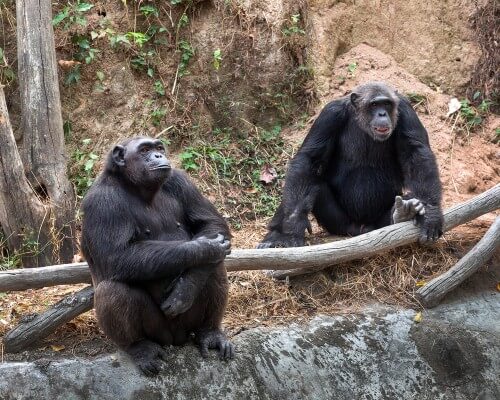Good news for the great apes: the US Institute of Health has announced the end of experiments on chimpanzees

Dr. Daniel Mader, Angle - news agency for science and the environment
The NIH, the US National Institute of Health, announced this week that it is completely stopping experiments on chimpanzees. Currently, the NIH holds 50 chimpanzees for research purposes and they are expected to be sent to wildlife sanctuaries. The NIH supports research in additional chimpanzees, which it does not own, and is expected to stop supporting them in the coming years.
This is the end of the process of ending the use of chimpanzees for research purposes. The process began about five years ago, on the recommendation of the American Institute of Medicine and on the recommendation of an internal review body of the NIH. In these five years, the demand for chimpanzee research at the NIH plunged to zero. In 2013, most of the NIH's 310 chimpanzees were decommissioned, and since then only one request for chimpanzee research has been submitted (and later withdrawn). In June 2015, research on chimpanzees was further restricted in the US, when they received the protection of an endangered species - a status that allows research to be carried out on them only if it can be shown that the research will benefit chimpanzees in the wild. However, researchers could still conduct non-invasive, behavioral research.
Where are you on the evolutionary scale?
Chimpanzees, by virtue of being the closest animals to humans, have been used for medical and psychological research for decades. The scientific ethics of animal research allows experiments to be performed on animals if the researchers show that the experiment is essential and that the experiment cannot be performed on a creature lower on the "evolutionary ladder" (a creature that is less developed in terms of perception of reality and suffering). That is, if a certain experiment can be performed on a dog, for example, and get reliable results - this experiment will not be performed on a monkey, if it can be performed on a mouse - it will not be performed on a dog, if it can be performed on a fly - it will not be performed on a mouse, and so on.
The increase in resistance to animal experiments, along with the improvement of research tools that allow experiments to be performed on simpler laboratory animals, on tissues and even on computer models, resulted in a reduction in the number of experiments performed on chimpanzees
Of course, this move has both supporters and opponents. Supporters claim that there is no longer any need for chimpanzee research and that this research is unethical. As proof they point to the fact that applications for chimpanzee research at the NIH have plummeted to zero in the last five years. Opponents claim that decommissioning this research tool will harm research to save the chimpanzee population in the wild or the study of an incurable human disease. Thus, these policy changes will cause, for example, the cancellation of research that may discover a vaccine for chimpanzees in the wild against Ebola. The support of the American authorities in this research (which, as mentioned, is expected to be completed), basically repays an ethical debt to chimpanzees in the world, for decades of using them for research purposes (not to mention hunting and destroying their habitats). Is it ethical that precisely now, when the American authorities are finally funding research that promotes the rescue of chimpanzees in the wild, the same authorities bring about the elimination of the research?
And what is the situation in Israel?
In Israel, the struggle of animal rights organizations to close the macaque farm in Moshav Mazor is remembered. These monkeys were bred in Israel and used for experiments around the world. Opponents of the farm claimed that it does not constitute a breeding ground for macaque monkeys for experiments, but serves as a transit station for macaque monkeys that are captured in the wild, imported into Israel, and exported abroad. It is also claimed that the experiments are used for commercial purposes (development of cosmetic products, for example) and not for medical purposes. Supporters of the farm claimed that the farm is used as a breeding ground and that the monkeys are used for medical research purposes. Supporters also claimed that closing the farm would lead to the opening of farms in developing countries with lower standards for keeping monkeys for experiments, and ultimately the welfare of the monkeys would suffer. In recent years, due to public pressure, government decisions led to the farm's closure.
To read the original article in the journal Nature
More of the topic in Hayadan:
